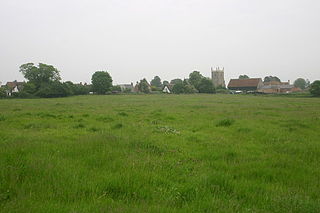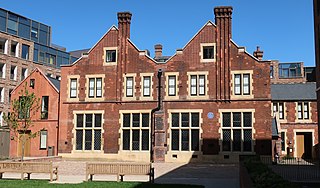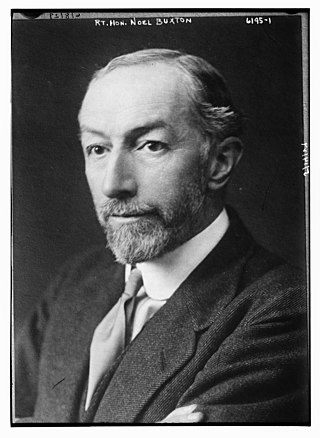Related Research Articles

Samuel Augustus Barnett was a Church of England cleric and social reformer who was particularly associated with the establishment of the first university settlement, Toynbee Hall, in east London in 1884. He is often referred to as Canon Barnett, having served as Canon of Westminster Abbey from 1906 until his death.

The English Poor Laws were a system of poor relief in England and Wales that developed out of the codification of late-medieval and Tudor-era laws in 1587–1598. The system continued until the modern welfare state emerged in the late 1940s.
The Royal Society for the Prevention of Cruelty to Animals (RSPCA) is a charity operating in England and Wales which promotes animal welfare. The RSPCA is funded primarily by voluntary donations. Founded in 1824, it is the oldest and largest animal welfare organisation in the world, and is one of the largest charities in the UK. The organisation also does international outreach work across Europe, Africa and Asia.

Marsh Gibbon is a village and civil parish in Buckinghamshire, England. It is close to the A41 and the border with Oxfordshire about 4 miles (6.4 km) east of Bicester.

Toynbee Hall is a charitable institution that works to address the causes and impacts of poverty in the East End of London and elsewhere. Established in 1884, it is based in Commercial Street, Spitalfields, and was the first university-affiliated institution of the worldwide settlement movement—a reformist social agenda that strove to get the rich and poor to live more closely together in an interdependent community. It was founded by Henrietta and Samuel Barnett in the economically depressed East End, and was named in memory of their friend and fellow reformer, Oxford historian Arnold Toynbee, who had died the previous year.

Dame Henrietta Octavia Weston Barnett, DBE was an English social reformer, educationist, and author. She and her husband, Samuel Augustus Barnett, founded the first "University Settlement" at Toynbee Hall in 1884. They also worked to establish the model Hampstead Garden Suburb in the early 20th century.

Octavia Hill was an English social reformer, whose main concern was the welfare of the inhabitants of cities, especially London, in the second half of the nineteenth century. Born into a family of radical thinkers and reformers with a strong commitment to alleviating poverty, she herself grew up in straitened circumstances owing to the financial failure of her father's businesses. Home educated by her mother, she worked from the age of 14 for the welfare of working people.
The Charity Organisation Societies were founded in England in 1869 following the 'Goschen Minute' that sought to severely restrict outdoor relief distributed by the Poor Law Guardians along the lines of the Elberfeld system. In the early 1870s, a handful of local societies were formed with the intention of restricting the distribution of outdoor relief to the elderly.
The settlement movement was a reformist social movement that began in the 1880s and peaked around the 1920s in the United Kingdom and the United States. Its goal was to bring the rich and the poor of society together in both physical proximity and social connection. Its main object was the establishment of "settlement houses" in poor urban areas, in which volunteer middle-class "settlement workers" would live, hoping to share knowledge and culture with, and alleviate the poverty of, their low-income neighbors. The settlement houses provided services such as daycare, English classes, and healthcare to improve the lives of the poor in these areas. The settlement movement also spawned educational/reform movements. Both in the United Kingdom and the United States, settlement workers worked to develop a unique activist form of sociology known as Settlement Sociology. This science of the social movement is neglected in the history of sociology in favor of a teaching-, theory- and research university–based model.

Noel Edward Noel-Buxton, 1st Baron Noel-Buxton,, was a British Liberal and later Labour politician. He served as Minister of Agriculture and Fisheries under Ramsay MacDonald in 1924 and between 1929 and 1930.

Sir Laurence Nunns Guillemard was a British civil servant who served as high commissioner in Malaya when it was under the British Empire.

Sir Charles Jasper Selwyn PC was an English lawyer, politician and Lord Justice of Appeal in Chancery.
Social work as a profession dates back to years ago, with the first social welfare agencies appearing in urban areas in the 1800s. It has its roots in the attempts of society at large to deal with the problem of poverty and inequality. Social work is intricately linked with the idea of charity work, but must be understood in broader terms. The concept of charity goes back to ancient times, and the practice of providing for the poor has roots in all major world religions.
Charles Latimer Marson was an influential figure in the second wave of Christian socialism in England in the 1880s. Later between 1903 and 1906 he collaborated with his good friend Cecil Sharp in the collection and publication of Folk Songs from Somerset vols. 1-3, which contributed greatly to the first British folk revival.
Stephen Edmund Spring Rice, styled The Honourable from 1839 until his death, was an Anglo-Irish civil servant and philanthropist. He served as the Secretary of the British Relief Association between 1847 and 1848.
R L Glasspool Charity Trust, known as Glasspool Trust, is a British charitable trust established in 1939 by businessman and philanthropist Richard Louveteau Glasspool.
The London Voluntary Service Council was the collaborative leader of Greater London’s voluntary and community sector, supporting some 60,000 voluntary, community and social enterprise organisations. It is a registered charity number 276886.
Reina Emily Lawrence was an American British lawyer and politician from Hampstead, who was the first female councillor in London, elected in December 1907, and one of the first women in the United Kingdom to be awarded a law degree.
Margaret Sewell (1852–1937) was an English educator who was Warden of the Women's University Settlement. She was a pioneer advocate of social work.

Brooke Lambert (1834–1901) was an English cleric and social reformer. He played significant roles in the Charity Organisation Society (COS) and the Metropolitan Association for Befriending Young Servants (MABYS), and as an ally of the settlement movement in London. In 1927, Clara Collet wrote that in Lambert, the reformer Charles Booth "seems to have found a kindred soul".
References
- 1 2 "LONDON COUNCIL OF SOCIAL SERVICE AND RELATED ORGANISATIONS". London Metropolitan Archives . City of London Corporation . Retrieved 15 August 2016.
- 1 2 3 Alumni Cantabrigienses: A Biographical List of All Known Students, Graduates and Holders of Office at the University of Cambridge, from the Earliest Times to 1900, Volume 2. Cambridge University Press. 15 September 2011. ISBN 9781108036146 . Retrieved 15 August 2016.
- 1 2 Loadman, John; James, Francis (2010). The Hancocks of Marlborough: Rubber, Art and the Industrial Revolution - A Family of Inventive Genius. Oxford University Press. pp. 215–216. ISBN 9780199573554 . Retrieved 15 August 2016.
- 1 2 Pierson, John (2011). Understanding Social Work: History and Context. McGraw-Hill Education (UK). p. 47. ISBN 9780335237951 . Retrieved 15 August 2016.
- ↑ Nunn, Thomas Hancock (1892). "The Universities' Settlement in Whitechapel". The Economic Review . 2. Oxford University Branch of the Christian Social Union: 478–495. Retrieved 14 August 2016.
- ↑ "A Council of Social Welfare. By Thomas Hancock Nunn, M.A." The Spectator . 19 March 1910. p. 25. Retrieved 15 August 2016.
- ↑ "A council of social welfare". Amazon.ca. Retrieved 15 August 2016.
- ↑ Thomas Hancock Nunn : the life and work of a social reformer. OCLC 3430381 . Retrieved 15 August 2016– via WorldCat.
- ↑ "Thomas Hancock Nunn Memorial Fund". Charity Commission. Retrieved 15 August 2016.